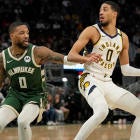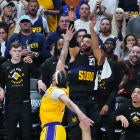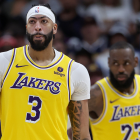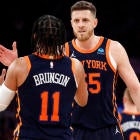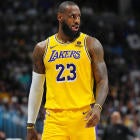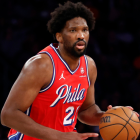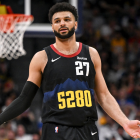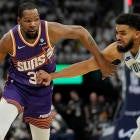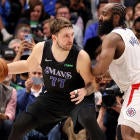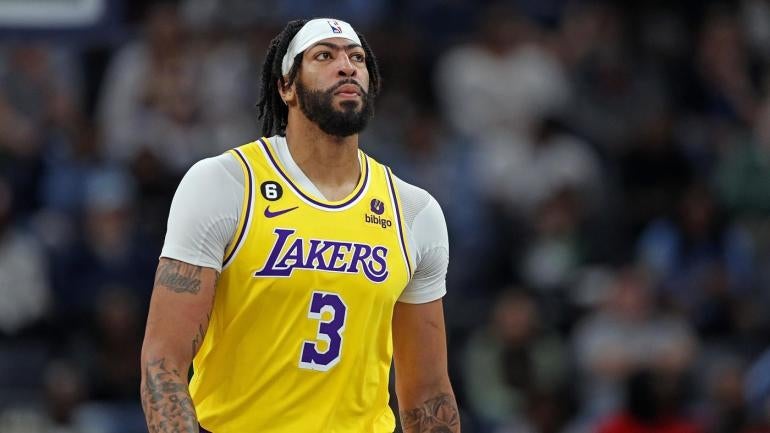
Very few NBA teams are stylistically dependent on a single player as the Los Angeles Lakers are on Anthony Davis. Dominating the paint is often their only win condition. They ranked sixth in the NBA in paint points this season, attempted the fourth most shots in the restricted area and took the most free throws in the league. They have the postseason's No. 1 ranked defense despite playing almost half of their games against Stephen Curry. This is largely because Davis has walled off the entire paint for the bulk of the postseason.
Yet the Lakers have no alternatives. They've rarely even used a backup center this postseason. Wenyen Gabriel has given the Lakers just 34 minutes this postseason. Most of the time, when Davis is out, the Lakers simply play small with LeBron James and Rui Hachimura sharing center duties. It largely hasn't gone well. In 130 minutes without Davis during the playoffs, the Lakers have been outscored by 18 points. They can survive brief stretches by the seat of their pants. But a full game without Davis? That's something the Lakers really aren't equipped to do.
And yet there's a chance that's exactly the situation the Lakers may find themselves in come Friday night when they host the Golden State Warriors for Game 6 of their second-round series. Davis sustained some type of head injury in the fourth quarter of Game 5 and did not return. The early prognosis appears to be positive, and the but there is no official diagnosis yet. Davis might be back for Game 6. He might be out for the rest of the series. We don't know. The Lakers don't either. They have to be prepared for either possibility.
There's no good strategy for winning without your best player. That is especially true when your entire system rests on the unique gifts of that player. But inferior NBA teams win games somewhat frequently. Every team in the NBA this season won at least 17 games. The Warriors lost both of their games against the Pistons this season. Upsets happen, especially in tiny sample sizes. The Lakers don't need to devise a strategy to beat the Warriors four times out of seven. They need to try something that can work once, for 48 minutes, that could at least give them a chance to reach the Western Conference finals.
Such a path exists, but it's fairly narrow and carries enormous risk. If the Lakers do indeed have to play Game 6 without Davis, here are the basic strategies they should consider as they would be attempting to pull off what would be an enormous upset.
Turn the game into a shooting contest
This strategy is going to sound counterintuitive. The Lakers have struggled to shoot 3's all season, and the Warriors are the greatest 3-point shooting team in NBA history. Over a sustained sample size, the Lakers would have no chance to win a shootout against the Warriors. But we're not dealing with a sustained sample here. We're dealing with 48 minutes. The Lakers can't outshoot the Warriors for a series. They might be able to do so for an hour.
Shooting 3's is the single most important thing an underdog can do because shooting 3's increases a game's variance. The longer the shot, the more randomness is typically at play. If you shoot 50 3's, you might make six of them and lose by 40 points. But you might also make 22 of them and score enough points to overcome a superior opponent.
The reverse can be true for your opponent. The Warriors have broken through offensively for stretches of the past two games largely because they've been able to get Davis out of the paint and finally score at the rim. They scored 70 points in the first half of Game 5 partially because they'd seemingly figured out how to find layups against the Lakers. But in the third quarter? They scored only 23 points because they missed all nine of their 3-point attempts. When the other team gets layups, it is frequently going to make most of them. But once you've forced them to take jumpers? You've introduced the possibility that they might miss.
If all of this just sounds like a fancy way of saying "hope you get lucky," well, yeah, that's the gist of this. Without Davis, the Lakers can't beat the Warriors on skill. Luck is their best bet if they're shorthanded.
Slow things down
Shooting luck isn't the only form of variance upset-seekers need to exploit. The clock is a weapon they can use as well. The more possessions two teams play, the more opportunities the better team will have to exert its superiority over the inferior team. It is therefore important for the underdog to slow the game down as much as possible. The fewer shots a team gets to take, the more important each individual shot is to the game's ultimate outcome. Good luck is far more powerful in a slow game than a fast one.
This should be a priority for the Lakers anyway. Golden State has outscored the Lakers on fast breaks in four of the five games they've played in this series. Their pace in Game 5 in particular really wore the Lakers out, and the Warriors visibly out-hustled the Lakers in transition for most of the game. Transition defense has been a flaw for the Lakers all season, but it's been magnified against Golden State.
Going smaller is a possible antidote for several problems here. It puts more shooting on the floor, but it also gives the Lakers more speed to chase the Warriors down in transition. Gabriel can't do a reasonable Davis imitation for 30 minutes. By overusing their few remaining big men, the Lakers would be trying to play a style they don't have the personnel to maximize. Instead, their path should be to try a different style entirely that fits with the players they do have available. The Lakers have guards, shooting and speed. That's what they need to emphasize right now.
In LeBron we trust
LeBron James has faced the Warriors shorthanded before. He spent the better part of the 2015 NBA Finals playing without both of his star teammates, Kyrie Irving and Kevin Love, and he still managed to drag that series to six games. In five of those six games, he attempted at least 33 shots. He hasn't topped 25 once yet this postseason.
The Lakers fortunately haven't needed him to yet, but it's a problem that was going to rear its ugly head at some point. While he's been able to show bursts of his younger self on game-tying layup attempts and fourth-quarter switch-hunts, James has largely been an off-ball player this postseason as he deals with a lingering foot injury. The other Laker ball-handlers have picked up the slack, and Davis has been sensational, but off-ball LeBron isn't going to cut it if Davis is injured.
So while the Lakers can employ a number of strategies designed to accommodate their status as an underdog if Davis is out, none of it matters if James is only taking a few shots every quarter. They're going to need something closer to the version of him that scored 51 points in Game 1 of the 2018 NBA Finals if they're realistically going to beat the defending champs shorthanded.
Maybe that player still exists within James. He did average nearly 35 points during the month or so that Davis was out during the regular season. But it's been months since we've seen James play so aggressively. He was healthier then than he is now. If the Lakers are going to have any chance at winning Game 6 without Davis, it starts and ends with a legendary LeBron performance. We haven't seen one yet this postseason. Maybe the desperation of Game 6 coaxes one last throwback out of the man who once overcame a 3-1 deficit to beat these very Warriors.














